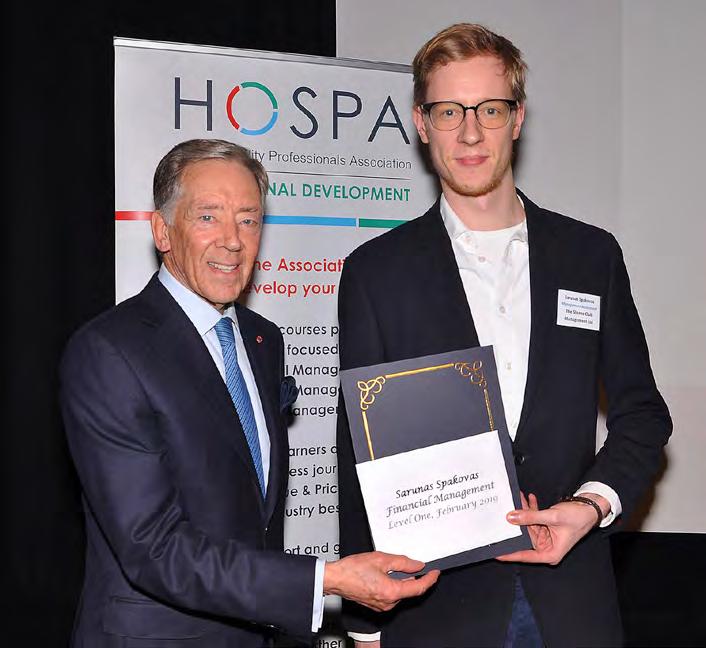
4 minute read
Cleaning through the downturn
by HOSPA
4 Steps to Enhancing Hotel Housekeeping & Guest Satisfaction in a Downturn
For hoteliers, the health and well-being of guests and staff are key. In the wake of rising COVID-19 concerns, Amadeus shares some additional precautionary measures hotels can take, both now and in the future.
Advertisement
Step 1: Assess your Current Plan of Action and Cleaning Regiment
Hospitality professionals pride themselves on high attention to detail and proper sanitation throughout the property to prevent the spread of germs and viruses is no exception. Thorough planning and execution across all departments will not only maximise efficiency, but will ensure a united, connected culture during times of crisis. Leaders should assemble their team to walk the property, assess areas of concern and create an action plan for improvement. During times of lower than typical occupancy or demand, operations teams can use that opportunity to upgrade the property’s surroundings without major delays or disruptions in service. When it comes to reprioritising the property’s needs and staff time, establish standard operating procedures (SOPs) that allow team members across departments to flag potential hazards, improve cleaning regimens, track maintenance issues and utilise inspection checklists to make sure nothing gets missed.
Step 2: Consider Increasing Hotel Deep Cleaning Efforts
To do so, think about the following:
Determine a plan of action for deepcleaning hotel guest r ooms, meeting
spaces, restaurants, the fitness center and other public areas. Good hotel hygiene pr otocols, such as implementing hand sanitiser stations and frequent cleaning of high-touch areas are also important to protect from infection. Get the Front Desk, Housekeeping, and Engineering teams together to schedule the right action plan to avoid disruption to operations and room readiness. Educate teams about standard operating procedures and best practices for each of their departments so they are fully aware of what they need to do, and make sure they know how and where to flag any areas of concern
This is also a good opportunity to take a second look at your hotel housekeeping check-lists to identify any additional precautionary steps that may need to take place. Clearly document cleaning processes for different areas in the hotel.
Step 3: Consider Putting a Pause on Cleaning Opt-Out Programs
Whether for green efforts, loyalty initiatives or bottom-line saving efforts, cleaning opt-out programs have been on the rise. However, as
you reconfigure your property’s SOPs and ad-just cleaning measures, you may also want to assess the new health risk of compromising protective efforts in a time of crisis. During times of unpredictability, it is important to maximize the efficiency of staff hours to reduce labor costs and make sure resources are being allocated in the best possible way.
In addition to dirtier rooms, there can be other downsides to opting-out of daily hotel room cleaning. For example, having a roving team of room attendants provides several significant benefits that may otherwise go overlooked. Did you know that housekeepers are often first to discover maintenance and security issues? It pays to have someone checking on a hotel room every day.
Lastly, hotel room cleanliness is one of the most common complaints from guests on travel review sites, so the need for a well-organised cleaning process is an absolute must for every hotel. With health concerns more prevalent, guests may be on high alert when it comes to meeting their cleanliness standards.
Step 4: Open Lines of Communication
As is the case with any good crisis plan, keeping staff informed and addressing employee concerns can make a world of difference in the overall hotel guest experience. The need for increased flexibility with travel planning right now also calls for connecting with the guest even before arrival. A good way of doing this is by sharing additional updates of what you’re doing to keep your property safe from germs.
Upon arrival, from the moment a guest enters the hotel lobby, your staff sets the tone for what’s to come. A confident, pleasant encounter with front of house will immediately put the traveller at ease. Your hotel serves as a home away from home and having an open line of communication will create a sense of connection from minute one.
It’s also important for hotel management to be able to react quickly. Hotels are naturally fast-paced environments and having the ability to swiftly identify, communicate and act on areas of concern can be instrumental in case of an emergency.
During uncertain times, the need for efficient processes and best practice guidelines are an absolute must for every hotel. If your hotel is experiencing a downturn, use the time as an opportunity to better your property, staff and procedures. This will ultimately enhance the guest experience, improve brand reputation, enhance cleaning measures and inspire exceptional stays time and time again. Because after all, it’s all in the details.

Learn more about Revenue Management with HOSPA
This modular programme is delivered online and provides an opportunity to study in-depth the revenue management strategies and techniques applicable to the hospitality sector. You will benefit from:
Expert online tuition and guidance from leading practitioners Up-to-date web based course materials Free subscription to the online Journal of Revenue and Pricing Management A convenient way to study Relevant and practical work based learning HOSPA Associate (Cert Revenue Management) membership on completion of the full programme Fees from only £820 + VAT per level of study
All courses are endorsed by the Institute of Hospitality.
* STARTING MARCH 2020







